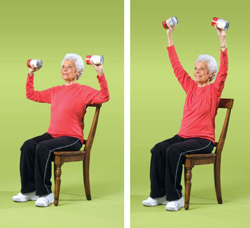The National Council on Aging has some online tools to promote chronic disease self-management. One is a web site entitled “Re-Imagine Your Life“, which explains chronic disease self-management programs (CDSMP), provides a video on how the training works, guides the viewer to find in-person or online workshops, offers several testimonials from people who are using what they learned from the workshops, and an FAQ about chronic disease self-management. The online version of the training is called, “Better Choices, Better Health”, and is currently available free thanks to a gift from sanofi-aventis to the NCOA. The font used on the web site is large and very readable, and the graphics are soft. The whole web site is very friendly.
The other online tool is a web site for alumni of the classes which they call the Healthier Living Alumni Community. It’s intended to provide a vehicle for support and reinforcement for implementation of the beneficial decisions that the participants initiated at the CDSMP. We need lots of tools like this to help people manage chronic illnesses, stabilize their conditions, improve function, and prevent further disability. It takes considerable effort to change a person’s lifestyle, but the benefits in quality of life, increased productivity, fewer days of work lost, diminished need for medication, decreased burden on families, and lower health care costs, taken together, are immeasurable. Sue Sweeney, Chair, Gerontology Department, Madonna University
 The Affordable Care Act is a very complex piece of legislation that is changing the health care landscape. Jim Luke and I are offering a presentation on some of the significant provisions of the Act on November 12, 2014 from 10 am to 11:30 am for the Michigan Intergenerational Network. The Villa of Redford is hosting the event at Villa at Redford, Village of Redford, 25340 Six Mile Road, Redford Township, MI 48240.
The Affordable Care Act is a very complex piece of legislation that is changing the health care landscape. Jim Luke and I are offering a presentation on some of the significant provisions of the Act on November 12, 2014 from 10 am to 11:30 am for the Michigan Intergenerational Network. The Villa of Redford is hosting the event at Villa at Redford, Village of Redford, 25340 Six Mile Road, Redford Township, MI 48240.